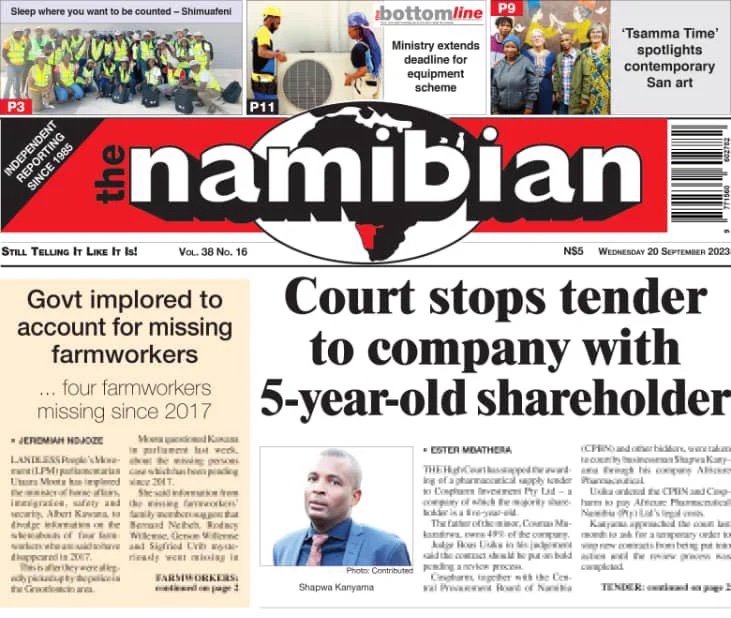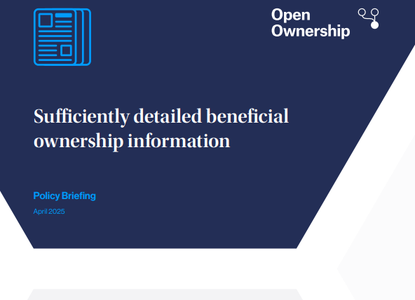Too young to count? Legal minors as beneficial owners

Photo by Dan Freeman on Unsplash
An Open Ownership long read
Young children being registered as beneficial owners can create confusion or raise suspicion, especially when they are connected to politicians, oligarchs, or other individuals in the public eye. An analysis of data from Luxembourg’s formerly public beneficial ownership (BO) register suggests that disclosing the names of legal minors may have been used as a tactic to obscure ultimate beneficial ownership. Children owning companies can also appear absurd.
The issues of whether legal minors can and should be named in BO disclosures, and, if so, whether their names should be made public, are largely untested in court. For policymakers and agencies creating BO disclosure rules, there are a few questions to consider.
Can minors be beneficial owners?
The first consideration is whether the substantive concept of beneficial ownership can apply to minors. A legal minor is a natural person who has not yet reached the age of legal majority (often 18). At the age of majority, a person is recognised by law as being an adult, capable of managing their own affairs and bound by legal obligations arising from their actions and the agreements they make. One or more parents or legal guardians assume responsibility for a minor until this time. These considerations may also apply to individuals who are past the age of majority but are considered legally incompetent, for example, due to cognitive impairment.
A robust definition of beneficial ownership considers both control and ownership. Control is the ability to influence decision making in a corporate vehicle formally (e.g. by having the right to appoint board members) or informally (e.g. by influencing the board’s decisions through family ties). Ownership includes the derivation of material benefits from a corporate vehicle (e.g. by owning shares).
For legal entities, such as companies, it seems likely that minors could be beneficial owners on the basis of ownership in most jurisdictions, as minors can often legally own assets. For example, in Nigeria and South Africa it is possible for an individual under the age of 18 to own shares in a company, but not to be a company director. Minors in some countries, such as the UK, can have a bank account that is in their sole name and which parents or guardians cannot access.
Moreover, minors can be beneficiaries of legal arrangements, such as trusts. It is recommended that all parties to a trust, including its beneficiaries, be reported as beneficial owners where disclosure requirements are in place.
Legal minors seem less likely to be beneficial owners by means of control, due to the limitations on their rights to make independent decisions. For example, in South Africa children over the age of seven can enter into contracts, but all minors should have parental or guardian approval. A minor between the ages of 7-17 could enter a contractual agreement, but their parent or legal guardian would have the ultimate right to control their participation until they are 18.
There are also limitations in some jurisdictions on minors’ ability to exercise control over legal arrangements. In South Africa, a person must be over 18 to be compos mentis and able to fulfil their fiduciary obligations as a trustee.

Following the award of a public contract to a company that was majority-owned by a minor and minority-owned by his father, a Namibian court recently "questioned the basis on which the minor’s father obtained power of attorney over the child’s shares and how the company’s board of directors was appointed, given the majority shareholder’s minor status." The Namibian, 2023.
When are minors reportable beneficial owners?
The second consideration is whether legal minors who qualify as beneficial owners should be reportable to a register. In most countries, not everyone who benefits from a corporate vehicle will appear in its BO information. For example, any natural person who owns shares in a company is materially benefiting from it, but countries create thresholds to determine which of these individuals should be reportable beneficial owners, based on risk. In one jurisdiction, this may mean owing more than 10% of shares, whilst in another it may mean a 25% threshold.
Countries do not tend to set an age limit on being a reportable beneficial owner. At the same time, age is often seen as a red flag for the misuse of nominee arrangements. Nominees are people who act on behalf of others to carry out official roles or responsibilities relating to corporate vehicles. Research commissioned by the European Union (EU) noted that “the presence of too old or too young owners may suggest that they are acting as nominees on behalf of the real owner – as stressed, among others, by the European Banking Authority”. The report also notes that irrespective of age, the use of family members as nominees is a broader concern.
Whilst minors can legally own assets transferred to them by an adult, if the real owner has not relinquished control, then the adult remains the ultimate beneficial owner. A declaration that leaves out a beneficial owner or does not disclose a person’s nominee status is incomplete and, in many cases, unlawful. Depending on the situation, a minor may be a beneficial owner along with the adult, or they may be a nominee.
A lack of data verification can contribute to the overreporting of minors as one form of misleading BO information. This has been a source of concern in the UK, where it was recently reported that 70 children were listed as company owners in the newly launched Register of Overseas Entities (ROE). It remains to be seen whether stronger verification measures proposed in the Economic Crime and Corporate Transparency Bill might reduce the number of children included in the ROE and in the UK’s central BO register.
In determining whether beneficial owners who are legal minors should be reportable to a register, those implementing reforms can consider the complexity and risks involved in determining whether they have ultimate control over their assets. For instance, the transfer of asset ownership to minor children can be a means of circumventing the impacts of sanctions, but it can also be a legally sound compliance strategy. That is, as long as the original beneficial owner has truly relinquished control – a difficult fact to verify. It may depend on case-specific factors, such as whether the minor can or does have a fully independent bank account, and, in the case of a trust, who the trustee is and whether anyone else is exercising influence over that person or the trust itself.
An alternative approach is to require a parent or legal guardian to be reported in a BO disclosure alongside or in lieu of a minor who qualifies as a beneficial owner. For example, in the United States, the proposed rules for its BO register “provides a special rule for reporting the information of a parent or guardian in lieu of information about a minor child”, including a requirement to declare “that such information relates to the parent or legal guardian”. This is despite the data being inaccessible to the public.
With this approach, the reporting requirements should be clear to those submitting the information, and the fact that the adult’s information is alongside or in place of a minor’s should be obvious to all data users. This may help deter adults from making misleading declarations that use a minor’s name as an undisclosed nominee. It may also help address the need for additional data protection considerations when personal information is made public in BO data.
Some jurisdictions also stipulate that if two individuals act jointly and they collectively meet the definition of a beneficial owner, they should each be considered a beneficial owner. The Slovak Republic and other countries even assume joint-action by spouses and family members. Jurisdictions therefore need to provide clarity in their rulemaking about whether and how to report parents and children who collectively hold ownership stakes that exceed the threshold for reportable beneficial ownership. For example, if a child owns 20% and a parent owns 6%, then together they would cross a 25% reporting threshold. In such a case, whether they are reportable beneficial owners will depend on whether or not they are assumed to act jointly, and if so, it should be clear whose name(s) should be reported as well as what level of detail about their relation to the corporate vehicle.
Should information about minor beneficial owners be made public?
The specific rights of children as a vulnerable group is the third consideration, especially when it comes to the publication of BO data. Beneficial owners are natural persons by definition, and they therefore enjoy certain fundamental rights. This increasingly includes legal rights to their personal data being protected. In many jurisdictions, data that conveys personal information about minors is accorded additional legal protections.
Legal minors have a limited ability to consent to the processing (collection, sharing, and use) of their personal information. They may also be unable to consent to being beneficial owners (e.g. when they are named as the beneficiary of a trust or granted shares as part of an inheritance scheme), and much less to their data being misused to help conceal the proceeds of unlawful activity. It may therefore be appropriate to place limitations on the processing of minors’ information as part of BO disclosure regimes.
For example, the EU’s General Data Protection Regulation limits the lawful collection of information about children even where there is otherwise a legal basis, such as legitimate interest. Prior to the decision of the Court of Justice of the European Union that invalidated public access to BO registers, the fifth European Anti-Money Laundering Directive already stated that “where the beneficial owner is a minor or otherwise legally incapable, Member States may provide for an exemption from such access to all or part of the information on the beneficial ownership on a case-by-case basis”.
The Cayman Islands similarly cited privacy considerations in a 2021 consultation on changes to its BO framework, noting that whilst data on minors could be collected, “only an adult beneficial owner’s name, month and year of birth, country of residence, nationality and the nature of control the person has over the entity, would be accessible by the public following request”.
The protection of minors’ information must be weighed against the risk of adults exploiting such measures as loopholes to keep their assets hidden and avoid accountability. Where children’s information is collected, restricting access to it to certain user groups – for example, to law enforcement and other government users, or certain data users outside government who can demonstrate a legitimate interest – and putting in place additional safeguards may be appropriate.
Related articles and publications
Publication type
Emerging thinking
Blog post
Topics
Open Ownership Register
Sections
Implementation
Open Ownership Principles
Verification


